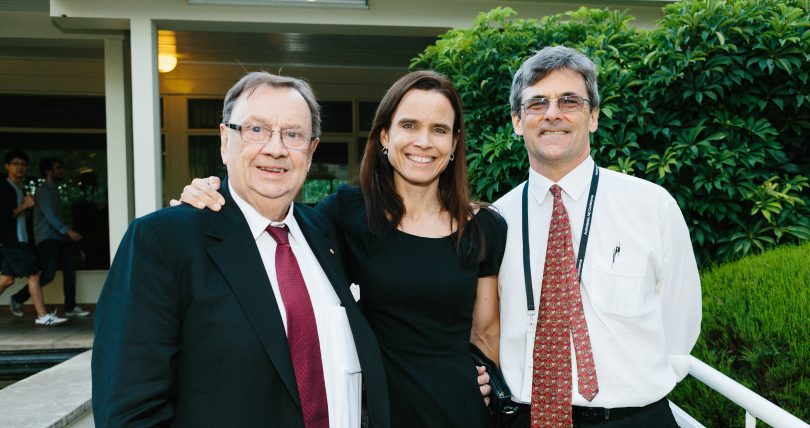The death of “adman” and philanthropist Harold Mitchell AC on February 10 has been widely mourned, as well it should be. Australia’s leaders from Prime Minister Anthony Albanese down have recorded their tributes to this larger-than-life character, whose achievements are all the more remarkable for his being a high-school dropout.
Among Harold’s many philanthropic endeavours was his foundational donation to Devpol, the ANU’s Development Policy Centre which I started in 2010. Harold provided $2.5 million of funding over five years starting in 2012. As our first major donor, Harold provided the essential building blocks for our research, which in turn allowed us to diversify our funding base.
There aren’t that many philanthropists in Australia, and very few with a focus that extends beyond Australia. Harold’s decision to fund us reflected his international outlook, his special interest in Timor-Leste and Indonesia, and his belief that while charity might start at home it should not end there. He was at the time Chair of the Board of CARE Australia.
It also helped that Stephanie Copus Campbell had become Harold’s chief adviser and close confidant. Stephanie had held senior positions in AusAID, had a love of PNG, and helped Harold connect to the sometimes arcane world of international development. When she vouched for us, Harold listened.
Harold was a fantastic donor. We quickly fixed on a sum, and he handed over the money, once a year for five years, without fuss. No need really for reports, certainly no need for acquittals. He trusted us. It could not have been more different from my other funding experiences.
Nor did Harold interfere. I only remember once when he sent some vexation and disappointment in my direction, and that was when the massive aid cuts of 2015 were announced. Aid to Indonesia was curtailed severely. Robin Davies, then our Associate Director, had argued that, if there had to be overall cuts, Indonesia had to bear the brunt. Harold, with his love for Indonesia, saw things differently, and told me so.
From time to time, Harold sent requests in my direction, but these were never onerous, and indeed typically became memorable adventures.
He invited me to a couple of private dinners, gatherings of the great and the good. These were voyages into a side of society otherwise closed off to me. I remember at one Harold expressed his outrage at the then emerging opposition in Australia to China’s Belt and Road Initiative. He thought it was obvious that Victoria should have signed up to this initiative, and couldn’t understand the fuss. He was a man of business, more sympathetic to the economic than the security perspective.
We always enjoyed Harold’s visits to Canberra, especially for our annual conference, which he frequented prior to COVID. He was a great conversationalist, and just the opposite of stuffy.
Harold was frustrated by the difficulties of development in our region. Papua New Guinea was so corrupt he would complain. He was more positive about Timor-Leste, but even there the going was tough. Still, he never gave up, or wanted us to give up.
Late last year, the Centre received a ringing endorsement for its work on labour mobility in a speech by Immigration Minister Andrew Giles who said that “The Development Policy Centre is a credit to the ANU, an important voice on migration policy, and a testament to how public policy can be shaped by the combination of good research and effective communications.”
I passed on this good news to Harold, and now I want to thank him publicly. It is not for me to say whether Harold’s investment in us has paid off, but I can certainly say that without his backing we wouldn’t have achieved what we have.
In fact, rather than focusing on impact, above all, Harold wanted us to be world-class. When I came to see Harold to make my pitch that was the one thing he stressed to me: we had to be not just the best in Australia, but the best in the world.
Of course I said that we would try, and it was a motivating aspiration but also a daunting one, a big ask. One thing we have done though which I think definitely is world class is the Mitchell Oration, our annual lecture series in which, as we say, “the most pressing development issues can be addressed by the best minds and most influential practitioners of our time.”
Fittingly, the first Mitchell Oration speaker in 2012 was the then Finance Minister of Timor-Leste, Emelia Pires. Since then, we’ve had a total of ten orations (we suspended the series during COVID). All of them have been delivered by high level national and international leaders: from Donald Kaberuka, former President of the African Development Bank; to Mari Pangestu, former World Bank Managing Director; to Richard Feachem, international health guru; to Ngozi Okonjo-Iweala, now running the WTO.
The Mitchell Oration is a world-class tribute to a world-class humanitarian. Thank you and vale Harold Mitchell.



Great tribute Stephen.
Harold’s support to the centre also meant many people coming up in the sector, like myself, got the chance to learn and engage, and the space to think critically and creatively about how we do aid. These spaces are all too rare in the Australian development sector, and I’m very grateful for the opportunity his support provided.
The things that the centre has achieved by leveraging the Mitchell grant really make a compelling argument on the impact of flexible funding. It was an extraordinary opportunity from an extraordinary person.